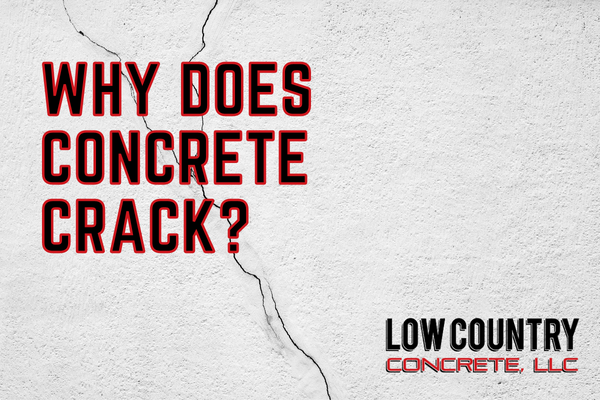You have a lovely concrete patio in your backyard, but one day you notice a crack in it. You may ask the question, “Why does concrete crack?” That question has a variety of answers.
Let’s look deeper at what may cause those cracks in your concrete.
Shrinkage
This is the most common cause of concrete cracking. Concrete is a mix of cement and water; as the concrete hardens, some water escapes through evaporation. Like most materials, concrete expands when it heats up and contracts when it cools down. During the drying process, concrete shrinks as it dries and hardens. This shrinkage can cause stress cracks, as the material’s rigidity causes it to pull apart. Cracks like these are more common in hot weather because the concrete dries faster in warmer temperatures.
Expansion Cracks
When concrete heats up, it expands and pushes against whatever is restraining it. It could be the ground or even another concrete slab. You may notice more expansion cracks next to sidewalks and driveways. If the concrete doesn’t have room to expand, it will crack. One of the ways we can prevent this is by adding an expansion joint made of a compressible material, which will allow some give in the concrete.
There’s Too Much Water Added To The Mix
If too much water is added during mixing, plastic shrinkage cracks can happen. Adding more water does make installation easier; however, it will cause the concrete to shrink more. Remember, excessive contraction will lead to more cracks.
Excessive Weight Cracks
This cause can be prevented. One homeowner we know needed to bring in a heavy load of fill dirt to put in their backyard. The company could only get the dirt to the back of the house by driving a heavy dump truck (full of dirt) over the concrete driveway. Can you guess what happened? Yep, the concrete driveway cracked!
Remember, concrete has load limits, even though those limits can be very high. If the weight exceeds the concrete load limit, expect cracks to form. While we rarely see this problem in our residential projects, remember that you’ll want to know how much weight your concrete can take before driving or parking heavy equipment on it.
Lack Of Control And Expansion Joints
Concrete will inevitably crack, no matter how many steps you take to prevent it. One way to try and prevent it is to control joints and expansion joints. So, what are control joints and expansion joints?
Control joints are weakened lines intentionally cut into the slab as it dries to control where cracks will form. By intentionally cutting lines in the slab as it dries, we can better control where cracks form, and cracking is less likely a concern because it will be where we want it to happen.
Expansion joints are gaps that are designed to accommodate the expansion and contraction of concrete. By providing space for the material to move, we can prevent it from cracking under expansion pressure.
Tree Roots
One of the things we love about living in Coastal Georgia and South Carolina’s Lowcountry is the beautiful trees we have. Unfortunately, however, those trees can wreak havoc on your concrete. As tree roots grow, you can imagine the pressure they put on the surrounding ground. This pressure can cause cracks in sidewalks, driveways, and patios.
Freezing Temperatures
Even though we live in the South, we can see some pretty chilly temperatures during winter. When concrete gets wet, it could freeze and then crack. The reason is that concrete is a porous material that absorbs water. When that water freezes, it expands and increases in volume. This expansion puts pressure on the concrete and can cause it to crack.
Low-Strength Concrete
Concrete is available in different strengths. If the inappropriate strength is chosen for the project, it can be too weak, causing it to be susceptible to cracking. An improper curing process can cause poor-quality concrete to crack. Therefore, it’s essential to choose the right strength of concrete for the job.
Use a Trusted Savannah and Lowcountry Concrete Company
As we said, why concrete cracks can have many different answers. One of your best defenses against cracking concrete is to work with a reputable company that can help ensure your concrete is less likely to crack.
At Low Country Concrete, our team has decades of experience in concrete projects. Our experts work with homeowners and commercial clients to understand the project’s scope and how to best tackle the concrete addition.
If you’re interested in a concrete project, call us or request a free quote. Whether you want a new concrete project handled or want to get rid of cracking concrete, we can help. At Low Country Concrete, we offer quality over quantity. Our primary focus is providing excellent quality service and total customer satisfaction. That’s why we guarantee our work!


Recent Comments